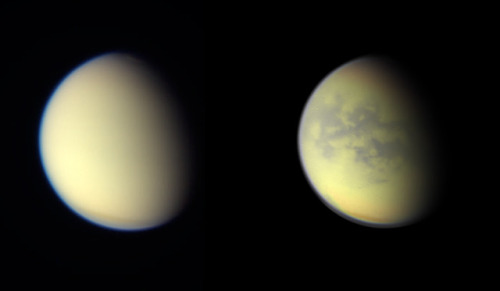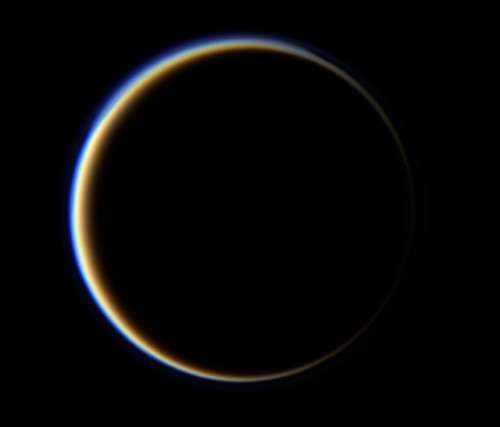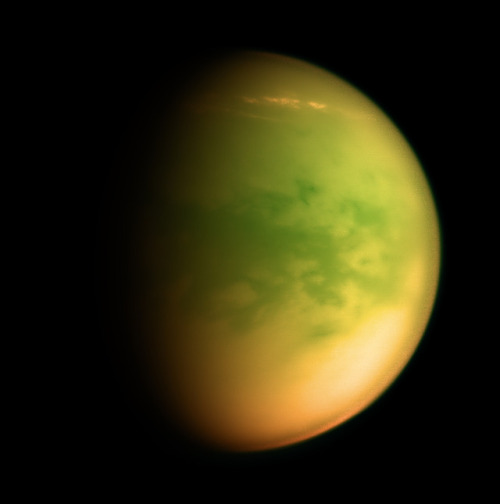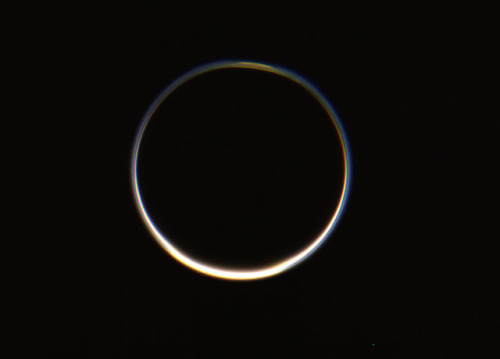Picture Of The Day - December 13, 2018

Picture of the day - December 13, 2018
Two large moons cross the face of an ice giant.
More Posts from Sharkspaceengine and Others










Images taken by the Cassini & Voyager spacecraft of Titan, Saturn’s largest moon. Titan is the only moon in the Solar System to have a thick atmosphere and lakes of hydrocarbons (methane and liquid ethane).
To know more about the moon Titan click here
Image credit: NASA/JPL/SSI/Cassini & Voyager ( precessed by: Kevin Gill )

Picture of the Day - February 13, 2019 (Late post)
Uniquely colored desert world with life.




Pictures of the Day - December 14, 2018
Insight A System - Inner-Most Planet (Insight A-I)
The Inner-most planet is a baked world orbiting perilously close to its sun at a distance of just 0.04 AU. The planet has a mass of roughly 0.56 Earth Masses and a diameter 93% that of Earth. It is rocky desert world. A thick carbon dioxide and sulfur dioxide atmosphere covers the surface with an atmospheric pressure 10 times that of Earth.
Surface temperatures are extreme, reaching 1,800 F during the day. At these temperatures some surface rocks melt into lakes of magma and the surface glows a dull red at night. The atmosphere also contains clouds composed of liquid glass droplets. Despite it’s close orbital proximity to the sun, it is not tidally locked. The planet has a moderately elliptical orbit with an eccentricity of 0.10. This results in a 3 to 2 orbit to spin resonance. In other words the planet completes three rotations for every 2 orbits, just like the planet Mercury.
BTW Everyone, it looks like Space Engine version 0.999 is probably going to be released sometime soon, probably before the end of the year. Can’t wait to start taking pics in it.
High Resolution Pictures
Insight A-I
From a Glowing Asteroid Moon
Atmospheric Glow
Sunrise

Picture of the Day - January 21, 2019
A ringed Titan under the dim glow of a red sun.
Orange Gem

Picture of the Day - October 28, 2018
Here we have another Titan-Like world with rings. Seas of liquid methane cover the surface, and a thick hazy nitrogen-methane atmosphere obscures most of the surface.

Cold blue gas giant and one of it's asteroid moons.

Like the gaping mouth of a gigantic celestial creature, the cometary globule CG4 glows menacingly in this image from ESO’s Very Large Telescope. Although it looks huge and bright in this image it is actually a faint nebula and not easy to observe. The exact nature of CG4 remains a mystery.
Credit: ESO
-
 harmonicgamingangel22blog liked this · 6 years ago
harmonicgamingangel22blog liked this · 6 years ago -
 sharkspaceengine reblogged this · 6 years ago
sharkspaceengine reblogged this · 6 years ago
My Space Engine Adventures, also any space related topic or news. www.spaceengine.org to download space engine. The game is free by the way. Please feel free to ask me anything, provide suggestions on systems to visit or post any space related topic.Check out my other blog https://bunsandsharks.tumblr.com for rabbit and shark blog.
294 posts





